Arizona Wild Flowers
Pictures, Photos, Images
Descriptions, Information, Reviews.
Arizona Night Blooming Cereus Cactus, Peniocereus greggii.
We Are Proud Of Our SafeSurf Rating!
Click On Any Of The Following Links By Amazon.Com
For Books, & Videos About Wildflowers Of Arizona & The Southwest USA. No Obligation!
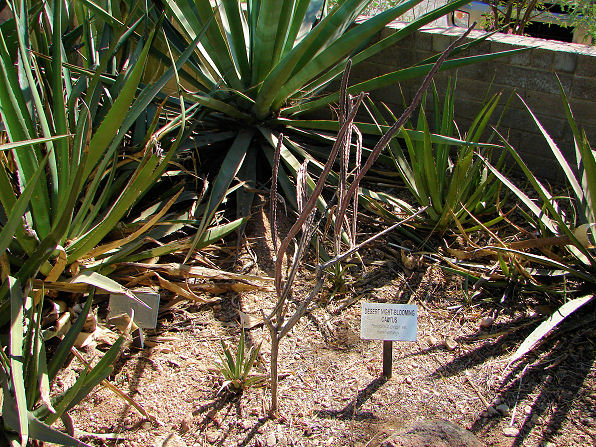 |
| Arizona Night Blooming Cereus Cactus, Peniocereus greggii February 15, 2006. We Will Follow The Bloom Cycle Of This Plant, See Below! |
|---|
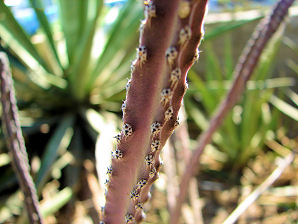 | 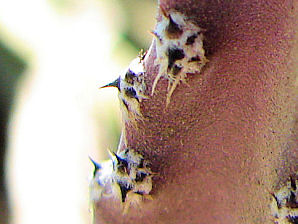 |
| Arizona Queen of the Night. Peniocereus greggii. Branch Thorns. | Arizona Night Blooming Cereus Cactus. Peniocereus greggii Thorns. |
|---|---|
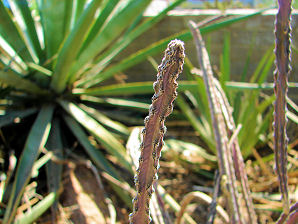 | 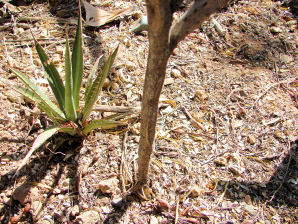 |
| Arizona Queen of the Night. Peniocereus greggii. Terminal Branch. | Arizona Night Blooming Cereus Cactus. Peniocereus greggii Trunk. |
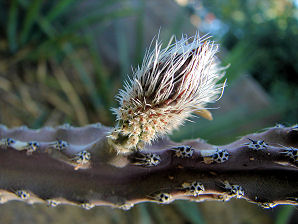 | 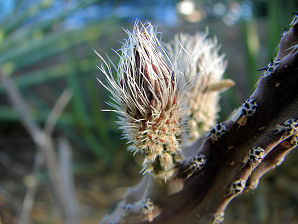 |
| Arizona Queen of the Night. May 24, 2006 Flower Buds. Flowers Bloom In About 3 Weeks. | Arizona Night Blooming Cereus Cactus. May 24, 2006 Flower Buds. Flowers Bloom In About 3 Weeks. |
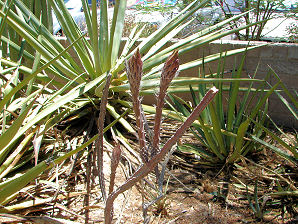 | 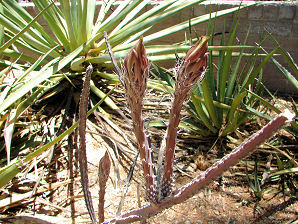 |
| Arizona Queen of the Night. June 14, 2006 Flower Stalks. Flowers Should Bloom Tonight! | Arizona Night Blooming Cereus Cactus. June 14, 2006 Flower Stalks. Flowers Should Bloom Tonight! |
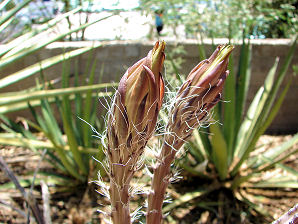 | 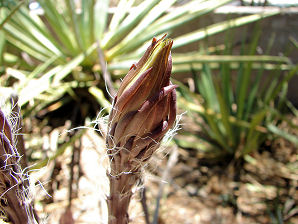 |
| Arizona Queen of the Night. June 14, 2006 Flower Stalks. Flowers Should Bloom Tonight! Note: Petals Starting To Emerge. | Arizona Night Blooming Cereus Cactus. June 14, 2006 Flower Stalks. Flowers Should Bloom Tonight! Note: Petals Starting To Emerge. |
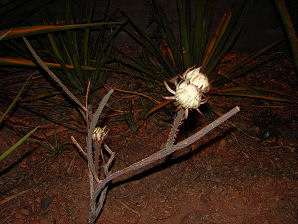 | 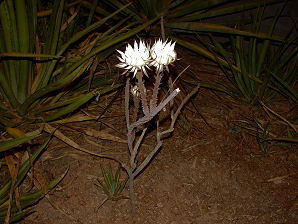 |
| It's Blooming! June 14, 2006 8:51 PM. Arizona Queen of the Night. Peniocereus greggii. | Blossom Opening! June 14, 2006 9:31 PM. Arizona Night Blooming Cereus Cactus. Peniocereus greggii. |
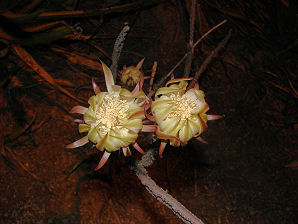 | 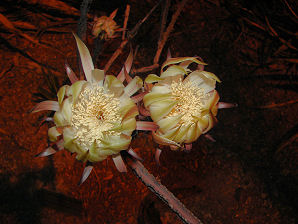 |
| Arizona Queen of the Night. June 14, 2006 8:51 PM. | Arizona Night Blooming Cereus Cactus. June 14, 2006 8:54 PM. |
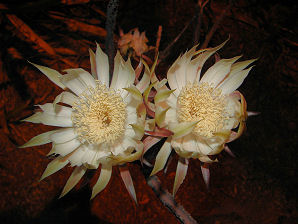 | 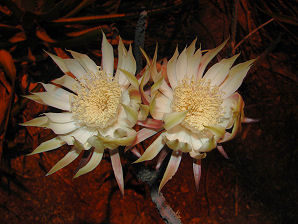 |
| Arizona Queen of the Night. June 14, 2006 9:29 PM. | Arizona Night Blooming Cereus Cactus. June 14, 2006 9:32 PM. |
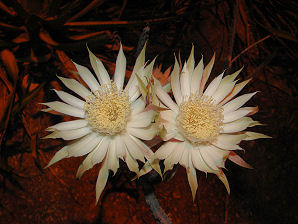 | 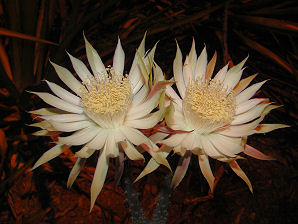 |
| Arizona Queen of the Night. June 14, 2006 10:44 PM. | Arizona Night Blooming Cereus Cactus. June 14, 2006 10:45 PM. |
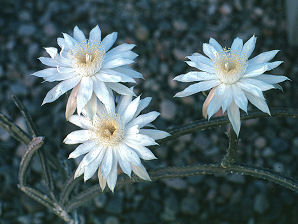 | 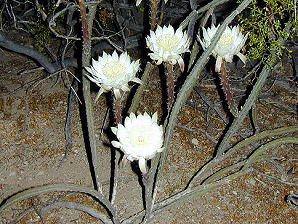 |
| Desert Night Blooming Cereus Cactus. Other Peniocereus greggii Flowers. Taken June 16, 2005. | Arizona Night Blooming Cereus Cactus. Other Peniocereus greggii Flower. Taken June 16, 2005 |
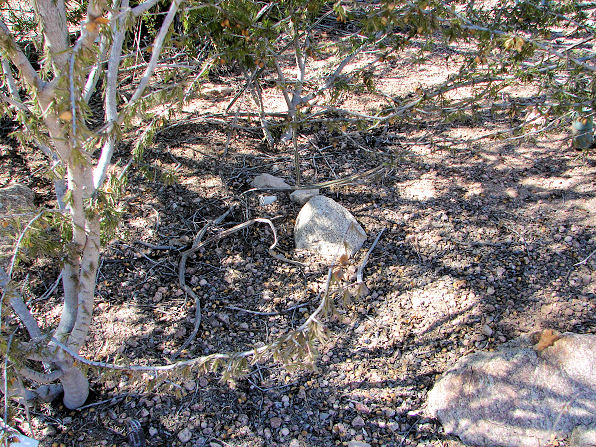 |
| Arizona Queen of the Night. Or Arizona Night Blooming Cereus, Peniocereus greggiii. This Is A Typical View Of This Plant In A Natural Environment. It Looks Like Dead Sticks On The Ground! |
|---|
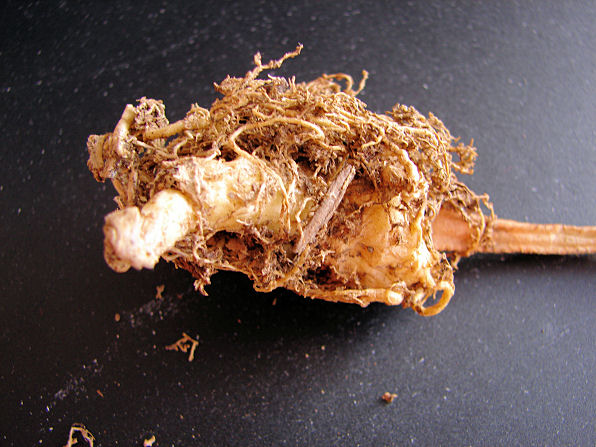 |
| Arizona Queen of the Night. Or Arizona Night Blooming Cereus, Peniocereus greggiii. 3-4-2008. Root. They Will Grow To Over 100 Pounds. |
 /
/

Arizona Night Blooming Cereus Cactus.
We wish to thank Wikipedia, the free encyclopedia for some of the information on this page. We share images and information with Wikipedia. Arizona or Desert night-blooming cereus, a perennial cactus that typically resembles a dead stick having from one to serveral stems arising from a single, very large tuberous root. As such, it is rarely noticed in the desert. Over the last few years as development of desert areas has increased in Phoenix and Tucson, these plants and their habitat have been destroyed. Peniocereus greggii is frequently called "Arizona Queen of the Night," however; the real "queen of the night" is Selenicereus grandiflorus. The Arizona Night Blooming Cereus Cactus has thin stems and a large underground tuber that can reach 100 pounds. Typically, they are about 15 - 25 pounds.
Quick Notes:
Height: Up To 1 to 10 feet Tall.
Flowers: White, strongly scented, about 4-inch-wide flowers bloom during June. Near the ends of its branches, developing at the end of a slender, long purplish-brown tube from an individual areole, the blossoms open during the early desert evening about sunset. The time for the flower to bloom is about 2 1/2 to 3 hours. They close again by the next morning sunrise.
Flowering Time: May - June. Mid June in the Tucson and Phoenix area.
Fruit: The fruit is up to 3 inches long, red-orange, ovoid, with black seeds.
Stem: From 1/2 - 1 inch in diameter consisting of an interior framework of about 4 to 6 woody ribs supporting the spongy tissue. The elliptical areoles are closely set with blackish spines; 1or 2 centrals about 2 mm long; with 6 to 9 conical radials.
Leaves: Cactus thorns are modified leaves. Their shape conserves water and adds protection to the cactus plant.
Found: Native to the Sonoran Desert of Arizona. Especially Pima, Yuma Counties. Primarily in Sonoran desertscrub in central regions of the Arizona, in areas where Larrea tridentata is found. Also found in northern Sonora, eastern Chihuahua, northeastern Durango, northern
Zacatecas, and Coahuila, in Mexico. The USDA claims it is native of the USA (AZ, NM, TX).
Hardiness:
Soil pH requirements:
Sun Exposure:
Elevation: 900 - 3,300 Feet.
Habitat: Desert slopes and flats, rocky bajadas. The Arizona Night Blooming Cereus Cactus begins life under a "nurse" plant, typically a desert scrub, palo verde or mesquite tree. The scrub or tree provides shade and increased water availability during the summer, and protects it from winter frosts.
Miscellaneous: Photos Taken Glendale Xeriscape Garden. February 15, 2006. Flowers June 16, 2005. Blossom Sequence June 14, 2006. Bloom Sequence photos have a redish color to them due to a bright redish light in the park where the photos were taken.
|



We Are Proud Of Our SafeSurf Rating!
Click On Any Of The Following Links By Amazon.Com
For Books, & Videos About Xerioscape Plants Of Arizona & The Southwest USA. No Obligation!
Back To Arizona Wild Flowers Home Page.
Back To Arizona Wild Flowers, Cream - White Flowers Page Five.
Back To Arizona Xeriscape Landscaping Main Page.
Back To Xeriscape Cactus Page Three.
Back To DeLange Home Page
© 1966 - Present, Audrey, Eve, & George DeLange
| © 1966 - Present, Audrey, Eve, & George DeLange |


